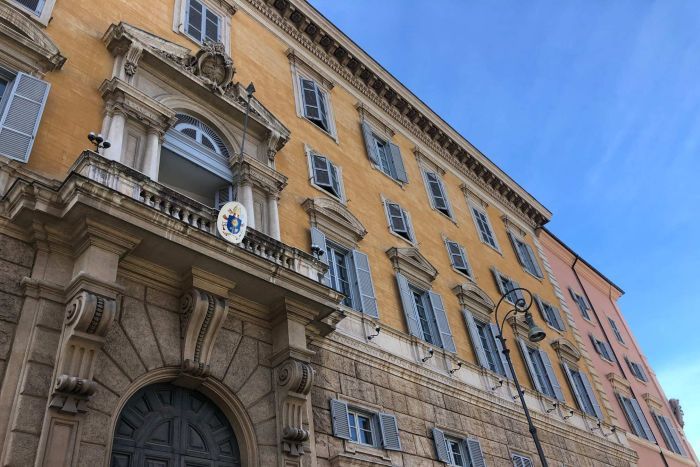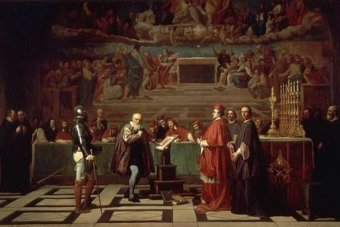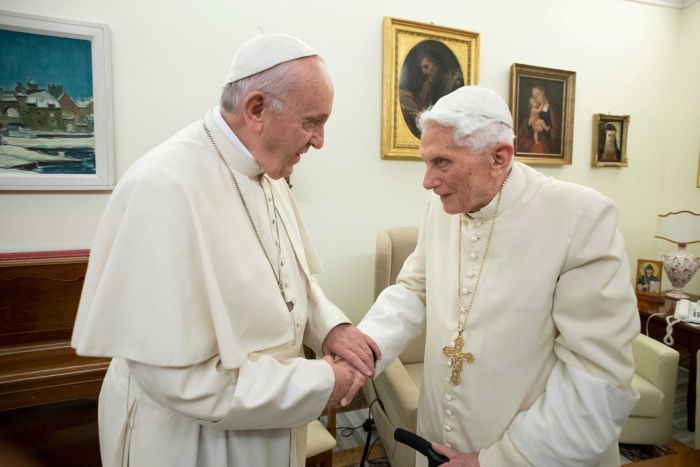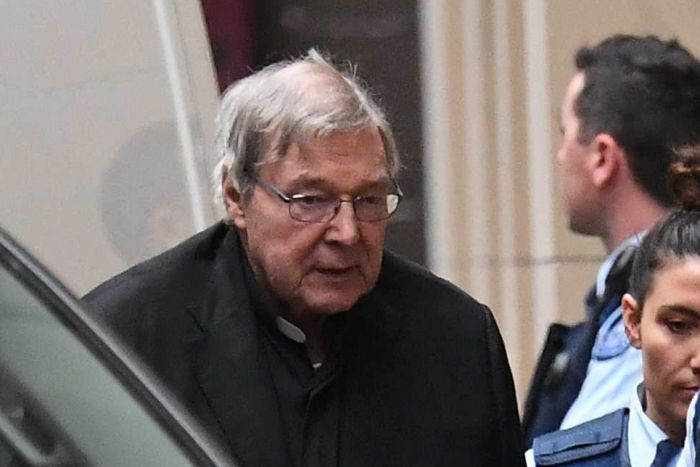What Is the Congregation for the Doctrine of the Faith and Why Is It Investigating George Pell?
By Michael Collett
When George Pell lost his appeal against his child sex abuse convictions last month, the Vatican noted that he still had one legal avenue remaining. "The Holy See recalls that the Cardinal has always maintained his innocence throughout the judicial process and that it is his right to appeal to the High Court," it said after the Victorian Court of Appeal handed down its judgment. On Tuesday, the Cardinal's legal team officially launched its bid to have his convictions quashed by Australia's highest court, but that's not the only process still underway. In February, the Vatican announced its own investigation into the case, giving the task to the Congregation for the Doctrine of Faith. That investigative body was founded in 1542 under a different name: the Sacred Roman and Universal Inquisition. Initially a tribunal trying to uncover heretical beliefs (or false teachings) That's why the Congregation's history is tied up with the Inquisition (note: the Spanish Inquisition was a separate institution, though the Roman Inquisition achieved its own infamy with its trial of Galileo for his belief that the Earth revolves around the Sun).
But not long after its creation, according to the Vatican, the institution's responsibilities were extended to include "everything relating directly or indirectly to faith and morals". It had one more name change, in 1908 (the Sacred Congregation of the Holy Office), before becoming the Congregation for the Doctrine of the Faith in 1965. To give a sense of its ongoing influence, Pope Emeritus Benedict XVI — back when he was still Cardinal Joseph Ratzinger — was the prefect, or leader, of the institution from 1981 until 2005, when he took on the papacy. It's because of its significance that the Congregation has also been known as La Suprema (The Supreme).
One of the Congregation's major roles is outlining doctrine High-profile recent examples include 1987's Donum Vitae ("The Instruction on Respect for Human Life in Its Origin and on the Dignity of Procreation") and 2000's Dominus Iesus ("On the Unicity and Salvific Universality of Jesus Christ and The Church"). The former ruled out IVF as being in accordance with Catholic Church teaching, while the latter caused controversy by declaring that Protestant congregations are "are not Churches in the proper sense". As well, then-Cardinal Ratzinger was Prefect of the Congregation for the Doctrine of the Faith when he oversaw the writing of the Catechism of the Catholic Church, which was published 1992 as a summary of church doctrine. The Congregation's other major role is enforcing discipline
In 2001, the Congregation was given sole jurisdiction over sins against the "sixth commandment of the Decalogue" — the Old Testament commandment against adultery — committed by clerics against minors. Previously, this was generally the responsibility of local bishops. According to the United States Conference of Catholic Bishops (USSCB), cases can play out in a few different ways: The Congregation can authorise the local bishop to hold a trial A trial can instead be held by the Congregation in Rome In the "clearest and most egregious cases", the matter can be referred to the Pope for the cleric's immediate dismissal The Congregation can decide there is not sufficient evidence of an ecclesiastical crime Canon law trials are held in secret and involve a defence lawyer and a prosecutor (known as a "promoter of justice"), with witnesses called to testify. Three judges deliver a verdict and, if the accused is found guilty, a penalty. The penalty for the sexual abuse of minors ranges from dismissal from the clergy to a "life of prayer and penance". But in all cases, according to the USSCB, guilty clerics are no longer allowed to engage in public ministry or themselves as priests or deacons. "Thus, even if a member of the clergy is not dismissed from the clerical state for having committed the crime of the sexual abuse of minors, his public ministry is still fully restricted in light of the gravity of the offense committed," it said. The decision of the Congregation can be appealed, but the decision of a second panel of appeal judges is final. One expert in politics and religion says she's not satisfied with the Vatican's approach Professor Carolyn M Warner from the University of Nevada, Reno said the Vatican had been slow to act on cases involving priests — and even slower when the allegations were against bishops or cardinals. "Even when [it appears] the Vatican knew of allegations years earlier, it waits until there is a secular/civil investigation and/or public scandal, such that it can't just bury the issue anymore," she said. She says this was the case for now former cardinal Theodore McCarrick in the US as well as for Pell, who remains a cardinal. Another problem, Professor Warner said, is that there were no provisions in canon law specifying the penalty for bishops failing to act on reports of child sexual abuse. But she also points out that in some instances, victims are instructed by their lawyers not to speak to Catholic Church officials. "It looks like the Church is being irresponsible, when what's really going on is that, to follow their own internal legal code, they usually have to interview the victim in order to substantiate allegations against the priest," she said. At a practical level, Professor Warner said the Congregation for the Doctrine of Faith appeared under-resourced and in need of more staff. She also said it should take lessons from secular systems about how to interview child sex abuse victims so that the system does not re-victimise them, and ensure complainants are kept informed of the status of inquiries. Nevertheless, Professor Warner said it was important that in addition to police and court procedures, the Vatican conduct its own investigations in order to maintain the integrity of its faith and the safety of its parishioners, as well as to deliver spiritual justice and healing.
|
.
Any original material on these pages is copyright © BishopAccountability.org 2004. Reproduce freely with attribution.



